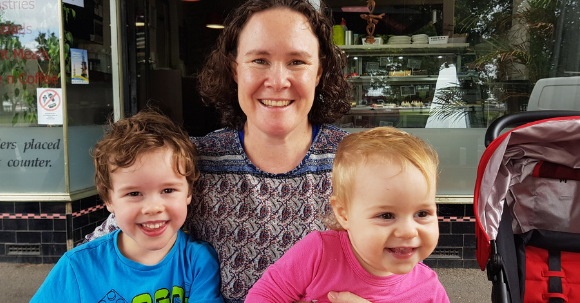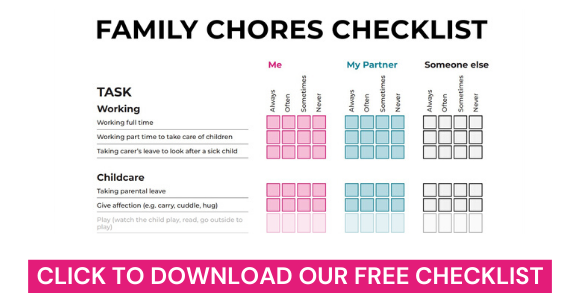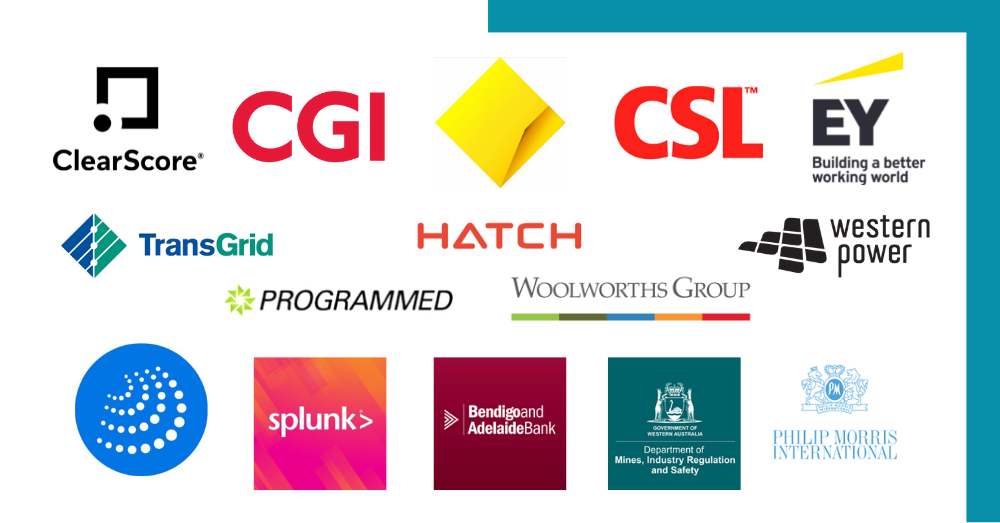Caring for the kids, ill or elderly relatives, partners, pets, the home, themselves (often in that order) — UN Women reports that women still do more of the domestic unpaid work. As a result, women have less time to work or progress in paid labor, which serves to consolidate the current unequal participation in the workforce, increases the superannuation gap, and reinforces the damaging stereotype of men as the primary breadwinners. In other words, unpaid work is perpetuating gender inequity.
You may have heard that ‘gender equity starts at home’, but any worthy employer knows that the workplace is where it really begins, and the very best among them are taking real action to implement progressive policies that support and promote the fair and equal distribution of responsibilities and opportunities.
Contents:
Child care and other facilities | Parenting support | Carers support | Special leave | Financial security | Male allyship | Next practice

What progressive employers are doing to redistribute the burden of unpaid work…
One of the most valuable steps an employer can take in helping to redistribute the burden of unpaid work is recognizing its existence and offering support beyond the workplace. This is clearly top of mind at South East Water, whose General Manager People and Safety, Bridget Thakrar, says:
“Work lives and personal lives are more blended than they ever have been before. Our role as an employer is to make sure people have access to all the support they need to help them transition from one to the next.”
Bridget Thakrar | General Manager People and Safety, South East Water
What does this support look like? For the employer Hatch, it comes in the form of a policy that allows either parent to identify as the primary carer and access their leave flexibly — a move that the company hopes will contribute to a shift in traditionally viewed gender-based caring responsibilities. The change means that parents can now incorporate both work and parental leave in the same week, and the initiative has seen a 550% year-on-year increase in men taking parental leave.

“I believe it is important that the roles and responsibilities at home are shared equally. Whilst my wife and I don’t have children, we do both work full time, and both in roles that sometimes require work outside of normal business hours. In these scenarios, helping each other out is very important to strike a work/life balance. Whether ‘work’ is paid work or domestic, helping each other out is a key element of respect for one another.”
Paul Englund | Director Consulting Delivery, CGI
Childcare, nursery schemes, and other facilities

CommBank is really proactive at supporting parents at work. We have three childcare centers currently open in Sydney. These centers are owned by the bank and offer priority placement for the children of our people, as well as the ability to salary sacrifice the fees. I love that CommBank does so much to support parents and parents returning to work. With two children myself, I understand how stressful it can be to find good-quality childcare, so for our people, this is an invaluable benefit.
Brooke Ferguson | Senior Manager, Employee Benefits, Commonwealth Bank
Similar supportive schemes:
- The workplace nursery scheme offered by Philip Morris Limited (Philip Morris International) covers the full cost of nursery for children up to the age of five on a pre-tax basis. The further education support covers 25% to 100% of training fees and related costs.
- DMIRS established family rooms to allow parents to work whilst caring for dependents when normal care arrangements are temporarily unavailable, or a child is unable to attend child care or school.
- Parkville site has an on-site childcare facility where CSL employees receive priority access.
Support for parenting challenges and struggles

“I’ve been working for CGI for over 18 years and it’s pleasing to see return to work options are not restricted to women returning from parental leave. All employees are often given time off and have the option to work on a part-time basis, so that they can also provide care for their families. As a Project Manager, my return to work was staggered and facilitated, starting at two days a week, increasing to three, and now four.”
Lauren Davis | Project and Service Delivery Manager, CGI
EY Australia also launched a new platform designed for parents, carers, and managers. It includes a variety of central resources like webinars, video content, stories shared by real employees, and checklists tailored to every stage of parenthood, family type, and caregiving responsibility. It also houses their parental leave policy, employee benefits, and talent contact information, which helps to ensure all employees know about the great support they have access to.
Western Power supports parenting from antenatal and beyond, and caring for elderly through its Circle in Staying Connect Parenting Portal. The portal helps employees and formal leaders navigate a range of parenting needs and provides practical advice for managing work and family life.
“I have had a number of conversations with my formal leader in regards to my return to work, who has been flexible in working around my start date, allowed me to have a say in decisions impacting my role whilst I have been on parental leave and has also supported my request for a Flexible Work Agreement, which is now well understood and a common occurrence in the business.”
Wendy Nevile | Network Project Delivery Team Leader, Western Power
Splunk has a directory of educational, academic, emotional and extracurricular support resources for working parents that it collates internally as well as via its external EAP program.
Woolworths Group partnered with Grace Papers Parental Leave to offer an online digital platform and personalized coaching, and a parental leave support program, which is designed to empower working parents to navigate family and career as well as assist with their transition back to work. This network provides important peer support through listening sessions, networking lunches and other educational and information events to stay connected. This plays an important part in assisting with their employee’s transition back into the workplace when they feel ready to return, and ensuring that team members understand the support they can receive from the company.
Initiatives to alleviate pressures faced by carers

During the September school holidays, CGI partnered with Kidsco who run virtual school holiday programs that provide primary school-aged children with fun, safe and educational activities that keeps them entertained whilst parents work.
- 80% of participating employees said the program exceeded their expectations
- 100% said they would have their children join the program again.
“Apart from engaging the children in some fun, educational and interactive virtual sessions, our employees also found the program beneficial, with 78% of employees saying it gave them greater structure to their day and 56% saying it not only increased their productivity, but also improved their mental health. Due to its success, CGI plans to run this initiative again.”
CSL‘s carer’s leave offers paid or unpaid leave for employees to provide care or support to a member of the employee’s immediate family (or a member of the employee’s household) who requires care or support because of a personal illness or injury of the member; or an unexpected emergency affecting the employee.
TransGrid developed a program called Share the Care that encourages more men to take up primary caring roles — an important step towards the creation of gender equality at the workplace. This initiative saw six fathers take it up within its first year.
Bendigo and Adelaide Bank’s initiative to support carers consists of three parts:
- A carers toolkit that provides information for carers themselves, and to help people leaders support the carers in their teams so they can balance their work-life with being a carer.
- Flexible working resourcing guidelines, flexible working policy and flexible work options agreement guidelines, (all written using gender-neutral language).
- Carers Week, which is a space that allows all carers to come together and share their experiences It includes carers of children, elderly parents, and family members with a disability.
Bain & Co’s consultants can access up to five days of paid emergency child care service, per calendar year. This benefit may be accessed in circumstances where the employee is required to work and their usual child-care arrangements are not available.
Hatch allows employees to commence paid parental leave at any time prior to the newborn child’s first birthday. Equally, this can be accessed twelve months from the official date of adoption, foster care arrangement (of a child under school age) or a child born of a surrogacy arrangement.
“My father passed away recently and without hesitation, I was allowed time off to grieve and I was checked on nearly every day. This to me was incredible as work/managers actually cared. People are lovely. Managers are so understanding.”
DHL Express team member
Not sure how to start sharing the responsibility? Download the WORK180 Family Chores Checklist:

Providing ‘Special Leave’
Splunk introduced up to six weeks’ ‘Pandemic Leave’ to allow their employees to care for themselves, their family or pets during a pandemic or natural disaster. It can also be used to care for children during a pandemic or disaster including distance learning or loss of daycare/childcare. Employees can also use this pandemic leave to look after their own mental health. Splunk has also introduced four global company holidays/rest days to encourage their people globally to take time out to rest and rejuvenate each quarter!
EY Australia‘s progressive leave policy grants access to an additional six weeks of leave, career breaks, and Life Leave of six to 12 weeks per year.
“My partner has Heart Disease, which means I am back and forth to the Hospital. DHL Express is a very caring and compassionate company.”
DHL Express team member
Financial security
South East Water pays superannuation on unpaid periods of parental leave for up to 52 weeks. This makes sure their people have ongoing financial security and investment in their careers during time away from the workforce, while helping close the wage gap between men and women. Bain & Co and Hatch also provides paid superannuation for unpaid parental leave.
To help to ease the financial transition back to work, Unitywater‘s Healthy Families parental policy includes the following:
- Family ease payment
- Continuation of long service leave and superannuation on both paid and unpaid leave up to 52 weeks
- The opportunity to return to work flexibly
Wondering what the superannuation gender gap is? Listen to our podcast and find the shocking answer.
Ensuring male allyship
According to David Zropf, Executive General Manager at UGL, the presence of male allyship at work is key to achieving gender equity — and we couldn’t agree more! Here’s what David had to say on the important topic:

“I’m acutely aware that women are faced with challenges every day, especially in the male-dominated industry in which I work. This drives my contribution to push for gender equity. All women should feel safe and included at work and be afforded the same opportunities as their male counterparts. We can all make a difference by calling out bad behavior when we see it, speaking up when something doesn’t sound right and challenging unconscious bias.
Striving for a gender diverse workplace reflects the values I stand for. That’s why I jumped at the opportunity to be the Executive Sponsor of the Women@UGL program, which I know will make UGL an even better place to work. Designed to elevate success, the program supports our people in leadership, management, networking, and professional development.”
David Zropf, Executive General Manage at UGL

“Changing behavior is hard and can take time. We encourage people to empathize with one another. By asking people to put themselves in each other’s shoes, you can truly understand what it means to walk in their shoes. Practically, this means when we see behavior that is not inclusive, we need to ask open questions with the person and help them understand how their behavior or comments are impacting the people around them. With an authentic approach, people will see these things differently and can make the change.”
Mark Rademaker | General Manager Human Resources, Programmed

“Over 25 years ago, I started with an opportunity to become a coach for kids and women’s hockey. I was drawn to this role, as I observed the standard of coaching in women’s teams was poor. I am currently enjoying coaching junior AFL, this time following my kids, where there is fantastic support and promotion for both boys and girls. Removing gender biases and gender stereotypes can start with the simplest of tasks and we all have a role to play. Every day is an opportunity to grow for all.”
Matthew Mullins | Director Consulting Delivery, CGI
.png)
ClearScore has held a number of internal workshops hosted by some of our male leaders on the subject of “Can Men Advance The Cause Of Gender Diversity?” This is always well attended and is honest and a safe forum to share views and collaborate. These sessions help generate a better understanding of the concerns or feelings our colleagues may have.
Allyship is very important at Splunk, which is why they promote allyship circles and have communication channels dedicated to the topic. They have also hosted Table Talk sessions around allyship, which included an APAC based Womxn’s History Month event, Allyship Table Talk and Allyship for LGBTIQA+ folks.
Next practice: more ways in which Endorsed Employers are supporting shared responsibility
- Healthy food deliveries
- Aid cleaning services
- Access to financial advisors
- Grandparents leave
- Kids summer camp allowance
We are so pleased to see so many WORK180 Endorsed Employers leading the change, and want to thank them all for talking to us about their progressive policies.
Want to find out what more these supportive employers have to offer? Check out their transparent policy tables on our job board today.

Find a workplace that will support shared responsibility
Recognizing the value of unpaid care and domestic work by promoting shared responsibility is just one of the UN Sustainable Development Goals (SDGs). These goals provide a clear blueprint for achieving gender equity by 2030 — a mission both WORK180 and 193 Member States of the United Nations are firmly committed to.
The WORK180 Endorsed Employers featured in this article have specifically committed to taking affirmative steps towards this goal. Independently, we measure, track, and prove how effectively they are fostering gender equity via the WORK180 Gender Equity Index.
